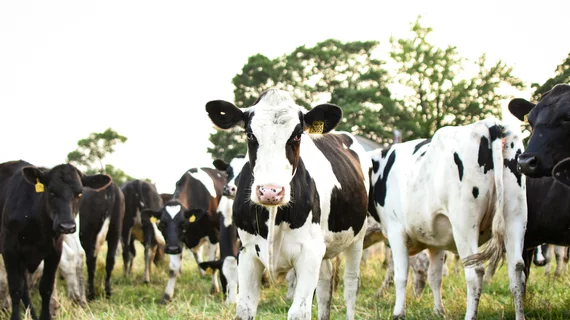Bird flu in cows: Interesting anomaly or troubling harbinger of things to come?
The avian influenza virus H5N1 has only turned up in two humans in the U.S., but its recent spread to dairy cattle has some experts on at least slightly elevated alert.
A tracking map updated daily by the U.S. Department of Agriculture suggests the cause of their concern: As of April 17, livestock infections were present in almost 20 domestic herds across eight states.
The mostly asymptomatic cow carriers were likely exposed via incidental brushes with the disease’s primary carriers—ducks, geese, gulls and other wild aquatic birds—or through normal proximity to infected barnyard neighbors like chickens and turkeys.
Meanwhile trackers have noted an uptick of H5N1 in mammals like bears, coyotes, skunks and foxes, which feed on dead birds.
Regardless of the infection pathways turned up by contact tracing, at least one of the two infected persons works on a dairy farm.
Worst-case scenario considered
For Andrew Pekosz, PhD, a molecular microbiologist and immunologist at Johns Hopkins, reasons for stepped-up watchfulness include the two human cases in light of the relative rareness of bird flu in people.
“The human population is essentially completely naive—has no preexisting immunity—to H5 viruses,” Pekosz tells the Johns Hopkins news team. “Therefore, similar to what we saw with COVID, in the worst-case scenario, if this virus enters humans and starts to spread, all of us are susceptible, and we could see massive increases in numbers of cases.”
More:
‘H5 viruses are rather deadly in poultry. They’re not so deadly in wild birds, but they seem to be deadly in mammals, and we don’t know what they’ll do in humans.’
The CDC reports well more than 90 million infections in domestic poultry across 48 states as of April 17.
‘Not alarmed but very vigilant’
In Missouri, a third-generation dairy farmer who is also a nutritionist tells Iowa Public Radio that everyone he knows is well aware of “the situation” with avian flu in cattle.
“Farm owners, farm managers are definitely keeping in touch with their veterinarians and with their other resources to understand how the situation is evolving,” says the farmer, Sean Cornelius. “I’d say [we’re] not really alarmed by it but being very vigilant.”
According to numerous outlets, infected cows tend to present only mild symptoms such as reduced appetite and milk production.
Meanwhile milk from cows with bird flu is safe for human consumption as long as it’s been pasteurized.
CDC: Risk to humans remains low, unchanged
Commenting on the second human infection, CDC’s information operation says the affected individual was exposed to dairy cattle in Texas and had eye redness as an only symptom.
The patient was told to isolate and is being treated with an antiviral drug for flu, CDC adds. More:
‘This infection does not change the H5N1 bird flu human health risk assessment for the U.S. general public, which CDC considers to be low. However, people with close or prolonged, unprotected exposures to infected birds or other animals (including livestock), or to environments contaminated by infected birds or other animals, are at greater risk of infection.’
For CDC’s recommendations on preventing, monitoring and investigating highly pathogenic avian influenza (HPAI), including H5N1 strains, click here.

